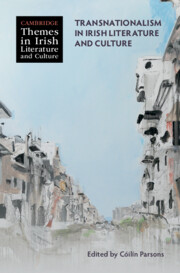Book contents
- Transnationalism in Irish Literature and Culture
- Cambridge Themes in Irish Literature and Culture
- Transnationalism in Irish Literature and Culture
- Copyright page
- Contents
- Acknowledgments
- Contributors
- Introduction: A Weak Theory of Transnationalism
- Part I Transnational Genealogies
- Chapter 1 “A World of New Wonders”: Maria Edgeworth’s Atlantic Ecology and the Limits of Transnationalism in the Nineteenth Century
- Chapter 2 “I’m apparently not famous anymore”: Appropriating Dion Boucicault’s Octoroon and Reckoning with Racial Violence in America
- Chapter 3 Destitute Recollection: Joyce’s Indian Translocations
- Chapter 4 “Under the shadow of the Monument”: On First Looking into Finnegans Wake
- Chapter 5 Eironesian Island Others: Irish Islands within Pacific Waters
- Part II Planets
- Part III Missed Translations
- Part IV Transnational Futures
- Select Bibliography
- Index
Chapter 1 - “A World of New Wonders”: Maria Edgeworth’s Atlantic Ecology and the Limits of Transnationalism in the Nineteenth Century
from Part I - Transnational Genealogies
Published online by Cambridge University Press: 13 November 2024
- Transnationalism in Irish Literature and Culture
- Cambridge Themes in Irish Literature and Culture
- Transnationalism in Irish Literature and Culture
- Copyright page
- Contents
- Acknowledgments
- Contributors
- Introduction: A Weak Theory of Transnationalism
- Part I Transnational Genealogies
- Chapter 1 “A World of New Wonders”: Maria Edgeworth’s Atlantic Ecology and the Limits of Transnationalism in the Nineteenth Century
- Chapter 2 “I’m apparently not famous anymore”: Appropriating Dion Boucicault’s Octoroon and Reckoning with Racial Violence in America
- Chapter 3 Destitute Recollection: Joyce’s Indian Translocations
- Chapter 4 “Under the shadow of the Monument”: On First Looking into Finnegans Wake
- Chapter 5 Eironesian Island Others: Irish Islands within Pacific Waters
- Part II Planets
- Part III Missed Translations
- Part IV Transnational Futures
- Select Bibliography
- Index
Summary
This chapter identifies the longstanding correspondence between the Anglo-Irish novelist, Maria Edgeworth, and the Jewish-American schoolteacher, Rachel Mordecai, as a transnational conduit of ecological inquiry. By teasing out the vagaries and idiosyncrasies of this transatlantic relationship (which lasted almost a quarter of a century), this chapter renders visible a minor tributary of transnational exchange that operated at the peripheries of the nineteenth century’s global power nexus. Both Edgeworth and Mordecai inhabited anomalous social positions and geographical locales, yet their shared ecological interests enabled them to contribute to wider channels of knowledge and experience in the period. Rather than celebrate their relationship as a triumph of lateral transnational exchange, however, the chapter exposes the complex power dynamics that simultaneously undergird and undermine their ecological collaboration. The correspondents’ mutual commitment to Enlightenment ecology may have engendered an invigorating intellectual exchange, but its limits and exclusions are witnessed most acutely in their nervous reflections upon slavery in the wake of the Nat Turner Rebellion of 1831. Even in its attempts to process and interpret Black resistance to slavery, their correspondence colludes to suppress the revolutionary potential of Turner’s alternative ecology.
- Type
- Chapter
- Information
- Transnationalism in Irish Literature and Culture , pp. 23 - 43Publisher: Cambridge University PressPrint publication year: 2024

